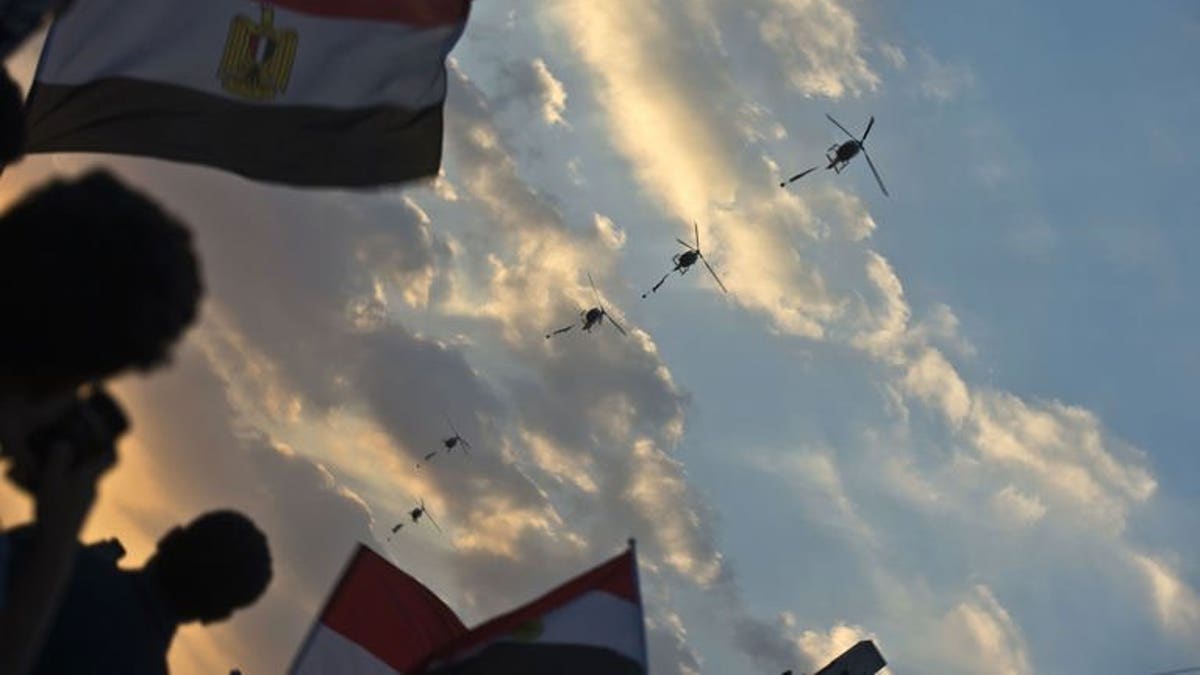
Egyptian army helicopters fly over as hundreds of thousands of Egyptian demonstrators gather outside the presidential palace in Cairo during a protest calling for the ouster of President Mohamed Morsi on July 1, 2013. (AFP)
CAIRO (AFP) – The Egyptian armed forces have piled pressure on Islamist President Mohamed Morsi, to applause from the opposition who want his resignation, but analysts say their intervention may be fraught with difficulties.
The high command said on Monday that "if the demands of the people are not met" within 48 hours, the military would intervene with a "roadmap" to end the standoff, after millions took to the streets to demand that Morsi step down.
Although the warning was aimed at the political class in general, Hassan Nafaa, political scientist at the University of Cairo, said it was "an ultimatum to the president".
"The army is giving him 48 hours to accept what the people are demanding," and after the demonstrations against the president, "there is only one demand, an early presidential election," which would mean him leaving power soon, he added.
The Tamarod (Arabic for rebellion) movement, which is behind the current protests against Morsi, as well as demonstrators in Cairo's Tahrir Square, were cheered by the army's statement.
Egypt's opposition had multiplied calls for the army to put pressure on Morsi since Sunday.
Opposition leader Hamdeen Sabbahi has urged military intervention if Morsi refuses to quit.
Defence Minister and armed forces chief General Abdel Fattah al-Sisi, who said last week the military would intervene if unrest broke out in Egypt, has become a key figure in the crisis.
Last week, Sisi warned "the armed forces have the obligation to intervene to stop Egypt from plunging into a dark tunnel of conflict and infighting".
But the army chief has refrained from backing either the president or his opponents in the standoff, or elaborating on what form military intervention might take.
The opposition hailed his statements, but the president's office was quick to deny any split between Morsi and his defence minister.
The return to prominence of the army, which headed the country between the fall of former president Hosni Mubarak and the election of Morsi in June 2012, could be problematic.
Political scientist Mostafa Kamel el-Seyyed said "the armed forces want the get the country out of this situation and to avoid a civil war, but no longer want to take power directly".
It also remains to be seen how Morsi and the movement from which he hails, the Muslim Brotherhood, will react to the military's warnings.
"An army intervention is not a long-term solution and the current opposition coalition is too weak and indecisive to provide effective leadership," said Oliver Coleman, senior Middle East analyst at British risk consultancy Maplecroft.
Some senior army officers admit they still have bad memories of the tumultuous transition when they ran the country.
At the time, the same opposition leaders who are today appealing to the military were highly critical of the ruling Supreme Council of the Armed Forces.
They accused the SCAF of continuing authoritarian rule and of carrying out human rights violations.
When Morsi sidelined the powerful head of the SCAF and then-defence minister Field Marshal Hussein Tantawi in August 2012, the move was widely welcomed.
The replacement of the septuagenarian officer, who was close to Mubarak and a veteran of the Arab-Israeli wars, by an officer 20 years his junior, marked a change of both generation and outlook for Egypt's top brass.
In recent months, the extent of Sisi's loyalty to Morsi has been the subject of intense speculation.
Originally presented as compatible with Egypt's Islamist-led government, Sisi is seen today as critical of the president, and someone who is keen to preserve the image of the military.
